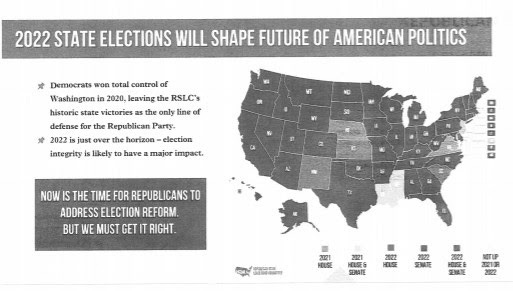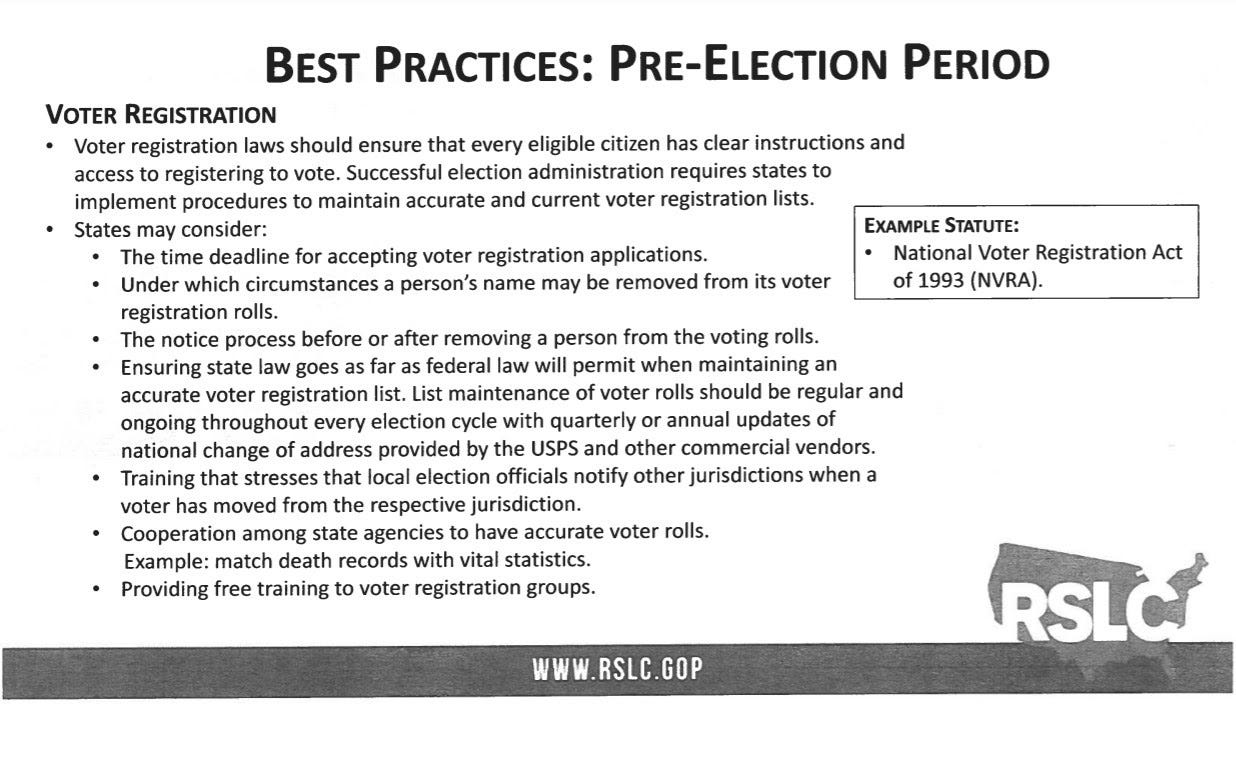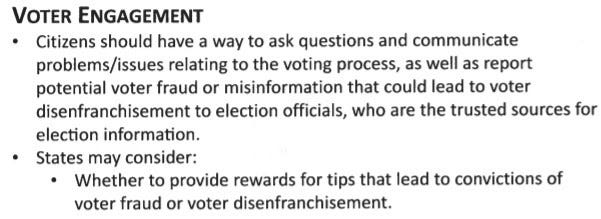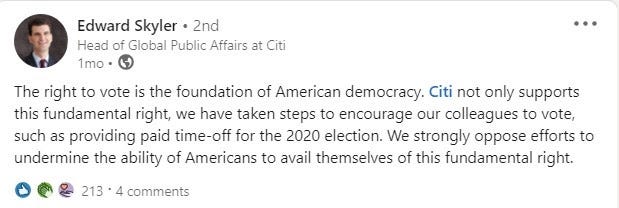Google, Deloitte, and Citigroup quietly collaborate with GOP group pushing voter suppression
Several large corporations that have recently issued public statements supporting voting rights — including Google, Deloitte, and Citigroup — are also funding and collaborating with a top Republican group advocating for new voter suppression laws. Internal documents obtained by Popular Information and Documented reveal the corporations participated in a "policy working group" on "election integrity" with the Republican State Leadership Committee (RSLC), a party organization that is actively supporting new voter suppression bills. Participation in the roundtable required a minimum annual contribution of $15,000 to the RSLC.
For example, on March 31, Google's SVP for Global Affairs, Kent Walker tweeted that the company is "concerned about efforts to restrict voting at a local level" and "strongly support[s] the John Lewis Voting Rights Advancement Act."
A week later, Google's State Policy Manager, Joe Dooley, was listed as a participant in a private RSLC policy working group led by the organization's "Election Integrity Committee." The April 6 presentation, obtained by Popular Information and Documented, details an array of proposals to suppress voting, including purging of voting lists, more stringent voter ID requirements, and targeting of voting centers. The RSLC also opposes any federal action to protect voting rights. The meeting was run by Alabama Secretary of State John Merrill (R), who has embraced Trump's lies and conspiracies about election fraud.
The RSLC presentation deck makes clear that the purpose of restricting voting under the guise of "election integrity" is to elect more Republicans. One slide asserts that Republican control of state legislatures is the "last line of defense for the Republican Party." The RSLC argues that Republicans must act "now" because "2022 is just over the horizon — election integrity is likely to have a major impact."
Another slide in the presentation is titled, "Why It Matters: The Democrats Smell Blood." It warns that "if Democrats win key state races in 2021 and 2022, they'll have the votes they need to pass their radical agenda."
Caleb Jackson, an attorney with the Campaign Legal Center who specializes in voting rights, described the RSLC's proposal as "attacks on access to the ballot box disguised as measures to fix something that’s not broken." Jackson said the agenda had "nothing to do with improving election security and… everything to do with stopping certain voters from voting."
Dooley's participation in the event was secured by a $20,000 donation from Google to the RSLC on February 11. Google also donated $35,000 to the RSLC in 2020. These donations were not from Google's PAC, which is a separate fund of employee contributions, but cash directly from Google's corporate treasury.
Google did not respond to a request for comment.
"Election Integrity" commission chaired by "Stop the Steal" conspiracy theorists
The April 6 presentation was delivered by Merrill with assistance from the RSLC staff. Merrill has backed Trump's false claims about election fraud. In December, flanked by a person in Revolutionary War garb with a Trump flag, Merrill spoke at a "Stop the Steal" rally in Alabama. During that event, Merrill questioned the integrity of the presidential results in six states, including California:
What happened in Georgia, what happened in Michigan, what happened in Wisconsin, what happened in Pennsylvania, Nevada, California, Arizona -- all of these states that have been in question -- is not something that started in October. It's not something that was necessarily even introduced or revealed in November. It started when the coronavirus first came to visit. Because some of the people that are in leadership positions in those states saw it as an opportunity...
Merrill also publicly supported efforts by Republicans in Congress to reject the results of the Electoral College vote and overturn the election. In the leadup to January 6, Merrill advised Congressman Mo Brooks (R-AL), who told a crowd in DC it was time to start "taking down names and kicking ass" shortly before the attack on the U.S. Capitol. Merrill also propagated specific falsehoods, including the claim that there were a large number of fraudulent ballots cast in Michigan.
Merrill is no longer the co-chair of the RSLC's Election Integrity Committee. On the same day he gave the presentation to corporate supporters of the RSLC, a right-wing blog released a recording of a woman who said she had an affair with Merrill. The next day, Merrill admitted the affair and announced he would not run for any elected office when his term expires in 2023.
But the co-chair of the Election Integrity Commission, former Michigan Secretary of State Ruth Johnson (R), who currently serves in the State Senate, shares Merrill's views on "election integrity." Johnson filed an affidavit in support of Republican poll watchers who sued the City of Detroit claiming "Detroit and Wayne County election officials purposely cheated the system with 'systematic fraud' to swing the election for Joe Biden." The claims in the lawsuit were meritless and the case was dismissed. In the legislature, Johnson, who chairs the Senate Elections Committee, has supported numerous bills to restrict voting. "The majority of the people in this state don’t believe that we have integrity in our elections," she said.
The RSLC's plan to suppress votes
The RSLC, which is supported by large contributions from major corporations, has actively supported voter suppression legislation around the country. In Georgia, for example, the RSLC not only supported the legislation that eventually was signed into law but also an earlier draft that would have banned drop boxes and ended no-excuse mail-in voting:
The plan presented to the RSLC's corporate partners in April advocates for the purging of voter rolls "as far as federal law permits." The group advocates removing voters based on data from the USPS, state agencies, and commercial vendors.
Marc Elias, an attorney specializing in voting rights and election law, noted that while the heading is about registration, "the entire section is about how to purge." The RSLC is encouraging states to consider notifying voters "notice before OR AFTER removal from the rolls, rather than before," Elias told Popular Information and Documented.
Excessively aggressive purging of voter rolls results in voters who "discover they’re no longer listed only when they arrive at the polling place," according to the Brennan Center for Justice. This is because states "rely on faulty data to flag potentially ineligible voters." These voters "either don’t vote or are forced to cast provisional ballots."
The presentation also advocates for stricter voter ID requirements, which makes voting more difficult for people who lack the required identification. After Election Day, the RSLC presentation suggests states provide bounties to citizens who come forward with evidence of fraud.
The RSLC presentation provides no evidence of fraud to justify these changes. Rather, it claims the changes are necessary because of declining confidence in the integrity of the election by Republican voters. This decline, of course, is the result of false information promoted by Trump and his Republican allies — including members of the RSLC.
The RSLC's corporate partners
A Deloitte representative listed as a participant in the April 6 policy working group. Deloitte's corporate website says the company "is committed to protecting voter access." Deloitte says it honors "the long struggle over the course of our nation's history by so many - particularly women and people of color - who have fought to ensure the right to vote for every American." Deloitte also signed a letter organized by Black corporate executives saying it opposes "any discriminatory legislation or measures that restrict or prevent any eligible voter from having an equal and fair opportunity to cast a ballot."
Deloitte's participation in the briefing was secured by a $15,000 donation to the RSLC in 2020. The company did not respond to a request for comment.
Citi was also listed as participating in the April 6 meeting, according to the agenda. In a LinkedIn post last month, Citi's Head of Global Public Affairs, Edward Skyler, said the company believes "the right to vote is the foundation of American democracy" and "strongly" opposes "efforts to undermine the ability of Americans to avail themselves of this fundamental right."
Citi donated $75,000 to the RSLC in 2020. The company did not respond to a request for comment.
TIAA was listed a participant but said that its representative "doesn’t recall attending." The company said it was "possible someone might have registered him to attend." TIAA's CEO, Roger Ferguson, said in an April interview on PBS that "voting is a fundamental right" because "millions have died or sacrificed their lives to ensure the right of Americans to vote." TIAA donated $150,000 to the RSLC in 2020. The company did not respond to questions about whether it agreed with the RSLC's policy proposals on voting or whether TIAA would continue to support the RSLC financially.
Comcast was listed as participating in the April 6 event. In April, Comcast said efforts to restrict voting were inconsistent with its values:
Voting is fundamental to our democracy. We believe that all Americans should enjoy equitable access to secure elections and we have long supported and promoted voter education, registration and participation campaigns across the country to achieve that goal. Efforts to limit or impede access to this vital constitutional right for any citizen are not consistent with our values.
Comcast donated $135,000 to the RSLC in 2020. The company did not respond to a request for comment.
Dominion Energy was listed by the RSLC as participating in the April 6 event. In February, Dominion Energy touted that it had donated $1 million to the Lawyers' Committee for Civil Rights, in part to finance work "protecting ballot access."
Novo Nordisk was listed as participating in the April 6 event but said that its representative did not attend. The company donated $150,000 to the RSLC last year.
Other major corporations who participated in the RSLC's working group include Walgreens, Enterprise, CVS Health, AstraZeneca, Rock Central, and Waffle House. According to notes from the meeting, Walgreens Vice President Casey Cesnovar asked a question about how RSLC intended to work with its corporate members when they rolled out its package of reforms. AstraZeneca donated $200,000 to the RSLC in 2020 and another $200,000 in 2010. Enterprise ($50,000) and Walgreens ($65,000) were also major donors. None of these companies responded to requests for comment.
This is a special joint edition of the Documented newsletter with Judd Legum of Popular Information, a newsletter about politics “for people who give a damn.” You can sign up for Popular Information’s fantastic newsletter HERE.









